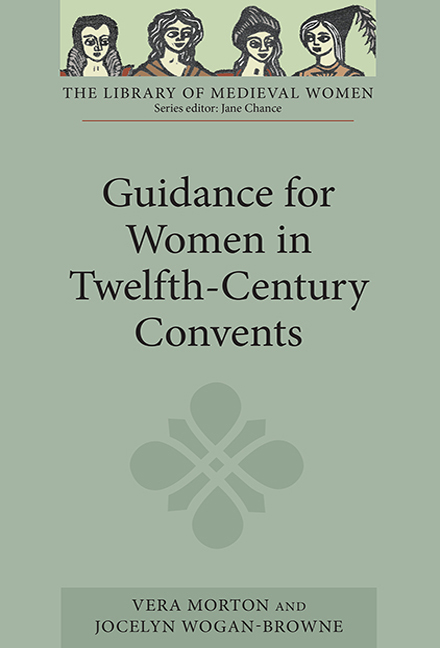Book contents
- Frontmatter
- Contents
- Preface
- Acknowledgements
- Abbreviations
- Introduction
- Note on Texts and Translations
- I Osbert of Clare, Prior of Westminster, to Adelidis, Abbess of Barking: A Thank-You Letter on Holy Widows, Virgin Fecundity and Precedents for Female Authority (Letter 42)
- II Abelard to Heloise: The History of Women's Roles in Christianity (Letter 7)
- III Peter the Venerable to his Nieces Margaret and Pontia: Of Nieces and Grandmothers and the Virgin Life at Marcigny (Letter 185)
- IV Osbert of Clare to his Nieces Margaret and Cecilia in Barking Abbey: Heavenly Rewards for Virgins in Barking (Letters 21 and 22)
- V Abelard to Heloise: On Educating Virgins (Letter 9)
- VI Goscelin of St Bertin: Lives of the Abbesses at Barking (Extracts)
- Interpretive Essay
- Bibliography
- Index
- Index
- Miscellaneous Endmatter
Preface
Published online by Cambridge University Press: 29 April 2017
- Frontmatter
- Contents
- Preface
- Acknowledgements
- Abbreviations
- Introduction
- Note on Texts and Translations
- I Osbert of Clare, Prior of Westminster, to Adelidis, Abbess of Barking: A Thank-You Letter on Holy Widows, Virgin Fecundity and Precedents for Female Authority (Letter 42)
- II Abelard to Heloise: The History of Women's Roles in Christianity (Letter 7)
- III Peter the Venerable to his Nieces Margaret and Pontia: Of Nieces and Grandmothers and the Virgin Life at Marcigny (Letter 185)
- IV Osbert of Clare to his Nieces Margaret and Cecilia in Barking Abbey: Heavenly Rewards for Virgins in Barking (Letters 21 and 22)
- V Abelard to Heloise: On Educating Virgins (Letter 9)
- VI Goscelin of St Bertin: Lives of the Abbesses at Barking (Extracts)
- Interpretive Essay
- Bibliography
- Index
- Index
- Miscellaneous Endmatter
Summary
Letters composed by women in the High Middle Ages survive relatively rarely, but many of the letters written to queens, noblewomen, abbesses and nuns are extant. This volume presents a selection from twelfth-century letters written to women in the female communities of England and Northern France. Although it is male clerics who speak in the letters, what they write is strongly conditioned by an awareness of the status and requirements of their female audiences. The most renowned letter from a churchman to an abbess included here was composed by Abelard at the request of Heloise to aid her in her work as abbess of the Paraclete. This letter's account of the role and achievements of women in Christian history is deservedly famous, though it has not been readily available in modern translation. A second letter by Abelard on the education of Heloise's nuns, also translated here, provides invaluable evidence for how women living professed Christian lives might be educated in communities.
The relationship of Abelard and Heloise, exceptional and celebrated as it is, is in this volume placed against a background of other epistolary relations in North West France and England. Selected letters from Osbert of Clare, Prior of Westminster, and Peter the Venerable of Cluny to abbesses and to young women in convents are translated here for the first time. These less well-known letters have their own considerable interest as well as providing a context for the correspondence of Abelard and Heloise.
In addition, this volume includes extracts from biographies of abbesses commissioned by their successors at the abbey of Barking. These extracts show medieval women administrators using the traditions of institutionalised female virginity and chastity in their own projects and responsibilities. The literary conventions of virginity and chastity writing could shape and express the working lives and ambitions of women as well as men in the twelfth-century church. Letters and biographical texts such as the ones translated here suggest that a richer literary and social history of medieval female communities in England and Northern France can be written than has been sometimes thought.
- Type
- Chapter
- Information
- Guidance for Women in Twelfth-Century Convents , pp. vii - viiiPublisher: Boydell & BrewerPrint publication year: 2003

